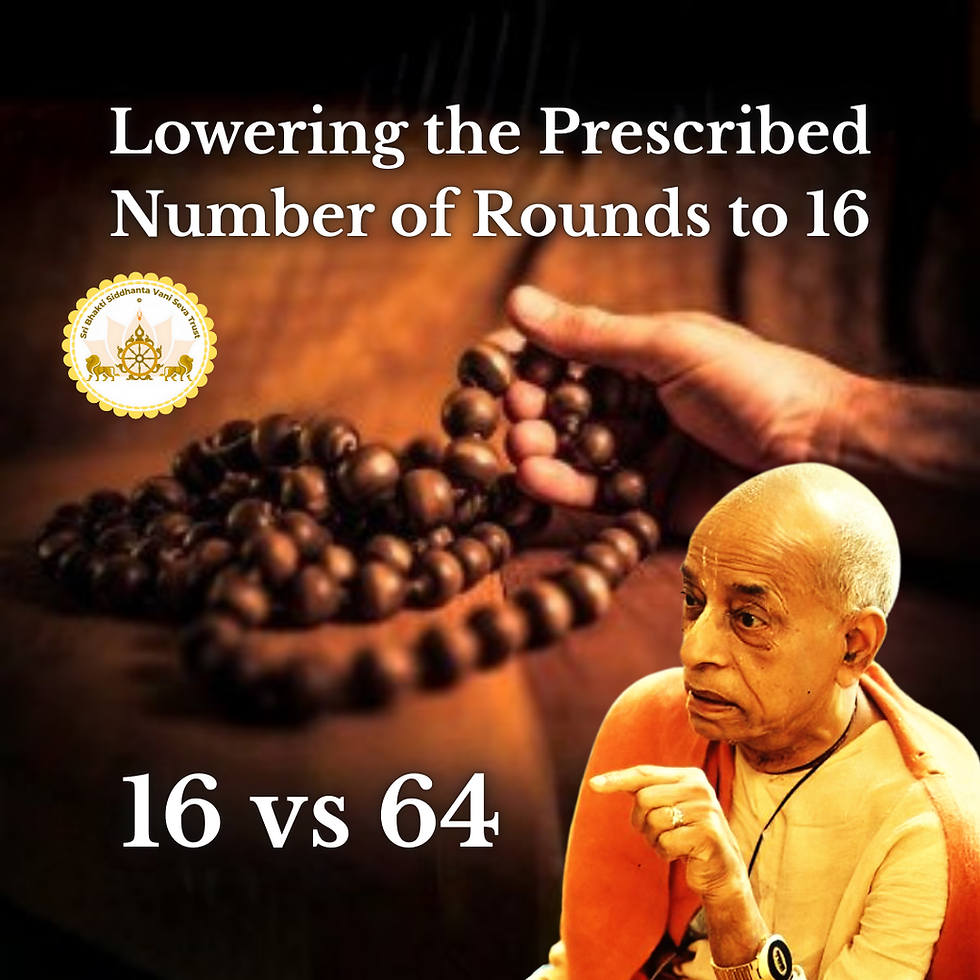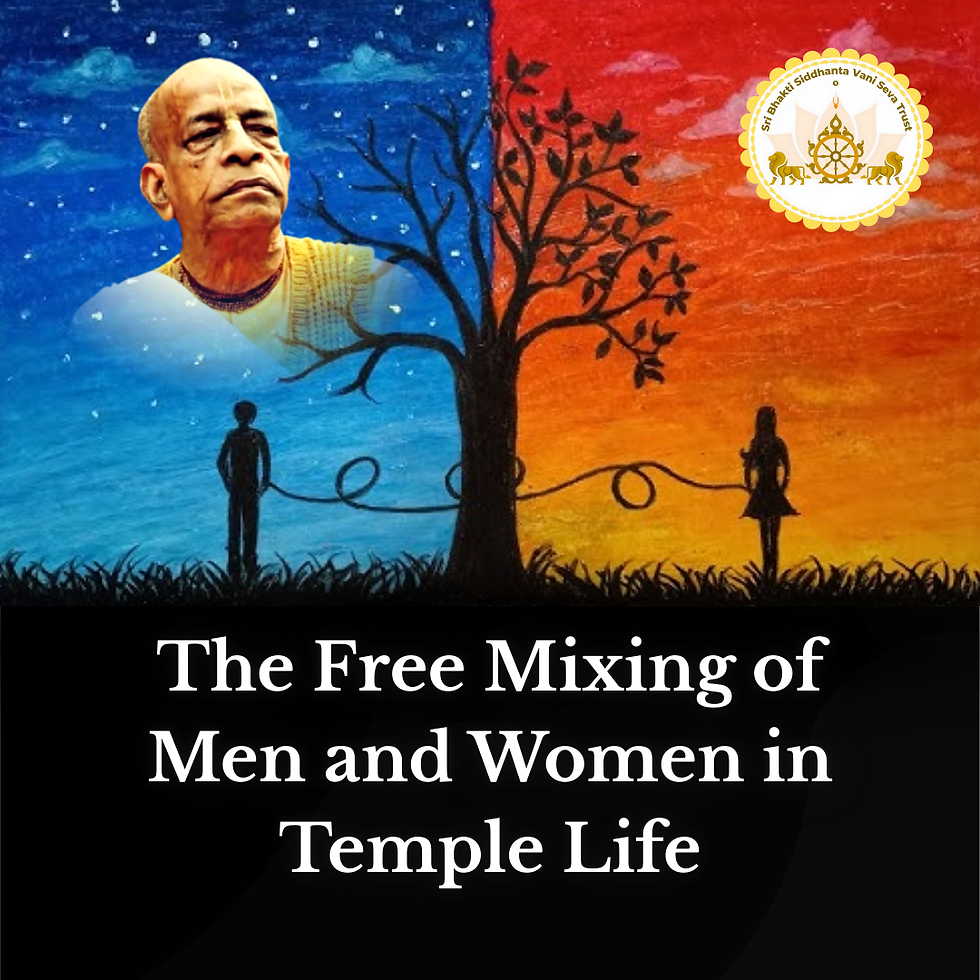Society consciousness vs. Sampradaya consciousness
- The Symbol of Faith
- Sep 22, 2025
- 4 min read
Updated: Sep 23, 2025

All glories to Śrī Śrī Guru–Gaurāṅga
(Samāja may pass away, but Sampradāya is eternal)
Date: 23.09.2025
By Sampradāya-saṁrakṣaka Śrī Śyām Dās Bābā Mahārāj
Gauḍīya Goṣṭhī-pati Paramahaṁsācārya-varya Śrī Śrīla Bhaktisiddhānta Sarasvatī Gosvāmī Ṭhākura Prabhupāda said in a thundering voice that— “A lion does not seek the approval of the forest. A true Gauḍīya does not compromise with siddhānta to please society. To stand alone with Caitanya-vāṇī is greater than to stand with thousands in compromise.”
Śrīla Bhaktisiddhānta Sarasvatī Ṭhākura Prabhupāda repeatedly warned his followers not to confuse society-consciousness with sampradāya-consciousness.
Society-consciousness means identifying oneself with an institution, group, or community, and measuring success in terms of numbers, respect, social position, or outward recognition. Such consciousness is rooted in loka-vyavahāra—mundane dealings—and easily degenerates into politics, party spirit, and the pursuit of lābha-pūjā-pratiṣṭhā (gain, honor, prestige).
Sampradāya-consciousness, on the other hand, is exclusive awareness of our eternal link (sambandha) with Śrī Guru, guru-paramparā & Śrī Caitanya-deva. It is not about preserving a name, building structures, or seeking approval from the public. It is about safeguarding the current of pure bhakti as handed down by the rūpānugas.
Śrīla Bhaktisiddhānta Sarasvatī Ṭhākura boldly declared that— “To seek the satisfaction of the public and to seek the satisfaction of the Supreme Lord is not the same. To declare this loudly is actual bhakti.” (Upadeśāmṛta-vyākhyā)
He also warned that— “If we identify ourselves only with a society, cutting ourselves off from the eternal flow of the sampradāya, then whatever we may do cannot be called bhakti.”
Śrīla Bhaktivinoda Ṭhākura likewise prayed in Kalyāṇa-kalpataru— “Let me never be entangled in party spirit or worldly societies, but let me be counted as a speck of dust at the lotus feet of the followers of Śrī Rūpa and Śrī Raghunātha.”
True sampradāya-consciousness means to see ourselves as eternal servants of the rūpānuga-dhārā—the line of Śrī Rūpa Gosvāmīpada—irrespective of worldly recognition. It means to live and die for the siddhānta-vicāra and sevā-mārga shown by our ācāryas, even if the whole society rejects us.
The absence of nirbandhinī mati—a firm and resolute intelligence, unwavering, and ceaselessly determined to the service of Śrī Guru and guru-paramparā—is itself the most grievous misfortune. Outwardly people make a pompous show of so-called bhajana, yet they never pause, even once, to reflect: “Why is true advancement in realisation of divine knowledge not arising within me?”
Śrīla Ṭhākura Bhaktivinoda wrote in Śrī Kṛṣṇa-saṁhitā—
“The eleventh obstacle of the Vaiṣṇavas is sectarianism, which takes the shape of the forest fire. Due to sectarianism a person cannot accept anyone outside of their own group as a Vaiṣṇava, and as a result they face many obstacles in finding a guru and associating with devotees. Therefore extinguishing the forest fire is most important.
Sectarianism is a natural by-product of the Absolute Truth. When ācāryas first ascertain and instruct the Truth, it is not polluted with sectarianism. But the rules and regulations received through disciplic succession regarding the goal and the method of achieving it are changed in due course of time according to the mentality and locale of the people. A rule that is followed by one society is not necessarily accepted in another society. That is why one community is different from another. As a community gradually develops more respect for its own standards, it develops hatred towards other communities and considers their standards inferior. These sectarian symptoms are seen in all countries since time immemorial. This is prominent amongst neophytes and found to some extent amongst madhyama-adhikārīs. Amongst uttama-adhikārīs, however, there is no trace of sectarianism.”
He further wrote in Jaiva-dharma, Chapter 11—
“We consider that it is essential to arouse [love] towards Bhagavān by any means possible. The door leading to gradual elevation is firmly shut if people on any level of worship are ridiculed or condemned. Those who fall under the spell of dogmatism, and thereby become sectarian, lack the qualities of generosity and munificence. That is why they ridicule and condemn others who do not worship in the same way as they do. This is a great mistake on their part. Those who become sectarian by obstinately locking themselves into dogmatic cults are soon diverted from lofty idealism, munificence and liberality. They deride and rail at anyone who does not follow their particular methodology in religious practice. This is a serious aberration on their part.”
In conclusion we can say that real progress in bhakti comes only through firm dedication to Śrī Guru and guru-paramparā, free from superficial show and the poisonous mentality of sectarianism. The true spirit of Gauḍīya Vaiṣṇavism is large-hearted, inclusive, and focused on awakening love for Kṛṣṇa—not on dogmatic superiority like we can see nowadays in some big spiritual organizations who completely lost the track shown by Gauḍīya Goṣṭhī-pati Paramahaṁsācārya-varya Śrī Śrīla Bhaktisiddhānta Sarasvatī Gosvāmī Ṭhākura Prabhupāda. Please try to think over & over about all these sensitive matters.
Gaura Hari! Hari bol!




%2017_25_edited.png)
Comments